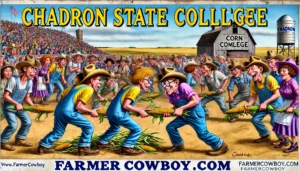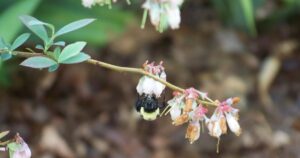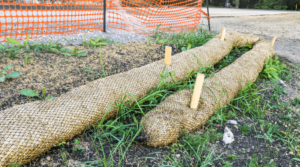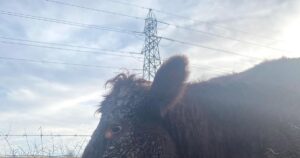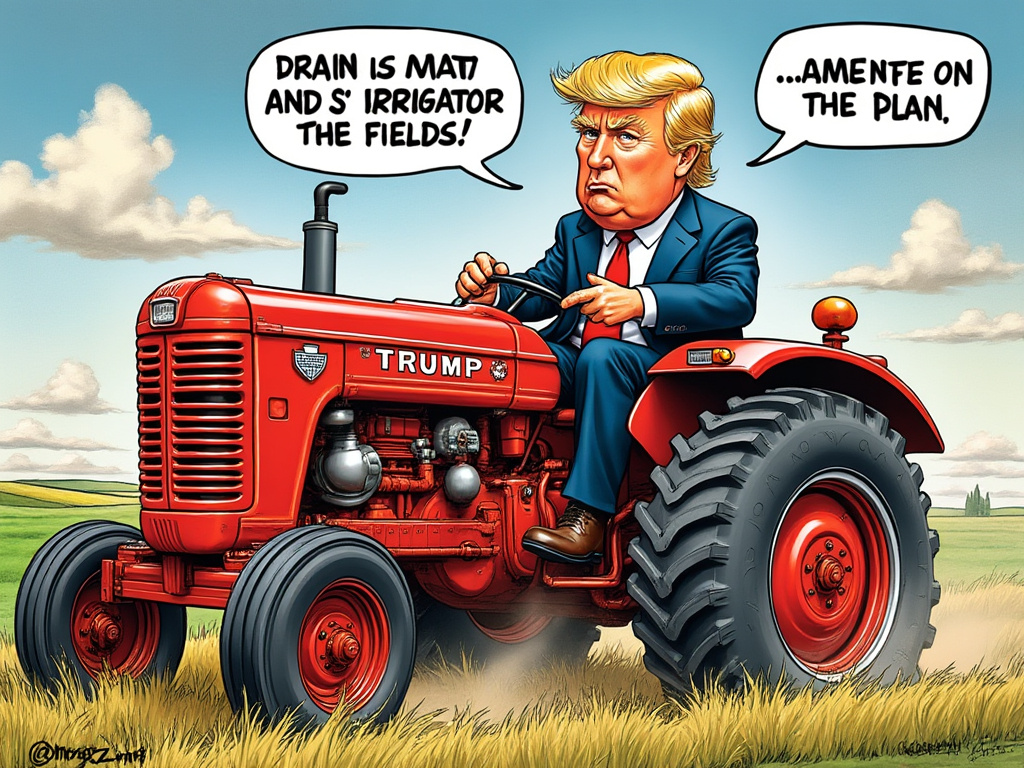
Election 2024 What if Trump Were Raised on a Farm 2.jpg
Donald Trump’s Farm-Boy Fantasy: What If He Grew Up on a Farm? How His Campaign Would Be Stronger Than a Bull
From Shoveling Manure to Shoveling Votes: How Trump’s Hypothetical Farm Upbringing Could Revolutionize His Campaign Strategy
Trump County, Kentucky — In an alternate universe, where the fields of rural America stretch as far as the eye can see and the air is filled with the scent of fresh hay, one of the country’s most famous figures didn’t rise to power from the top of a golden tower. No, in this world, Donald J. Trump grew up on a farm—a place where the art of the deal was learned through trading bushels of corn and the importance of “draining the swamp” was first realized while mucking out the pigsty.
Make America Graze Again
Trump’s new slogan, inspired by his farm upbringing, would be “Make America Graze Again.” This slogan would reflect his commitment to revitalizing rural America, bringing back the days when wide-open pastures and grazing livestock were a symbol of the nation’s prosperity.
At campaign stops across the country, Trump would speak passionately about the importance of supporting America’s farmers. “Our farmers are the backbone of this country,” he’d say, standing in front of a herd of cattle. “They’re the ones who keep us fed, who keep our economy strong, and who understand what it means to work hard every single day.”
His policies would focus on supporting small farmers, protecting agricultural jobs, and ensuring that America’s food supply remained secure. “We’re going to make sure our farmers have what they need to succeed,” he’d promise, “because when our farmers succeed, America succeeds.”

Who Needs a Campaign Jet When You Have a Tractor?
In this alternate reality, Trump wouldn’t be flying across the country in a private jet. Instead, he’d be touring the nation on a gleaming red tractor, making stops in rural towns and big cities alike. The tractor would be more than just a mode of transportation—it would be a symbol of Trump’s connection to the land and his commitment to the American farmer.
At each stop, Trump would step down from the tractor, shake hands with local farmers, and give speeches about the importance of supporting rural America. “This tractor has taken me from one end of this great country to the other,” he’d say, wiping a bit of dust from his brow. “And everywhere I go, I see the same thing—hardworking Americans who deserve a government that works just as hard as they do.”
The tractor would become a key element of Trump’s campaign, with merchandise featuring miniature versions of the vehicle flying off the shelves. “Who needs a fancy jet when you’ve got a trusty tractor?” Trump would say, earning cheers from his supporters. “We’re going to drive this country forward, one farm at a time.”
Campaign Slogan: ‘MAGA—Make Agriculture Great Again’
Trump’s rebranding would focus on revitalizing American agriculture, with a new slogan: “MAGA—Make Agriculture Great Again.” The slogan would reflect his commitment to supporting farmers, protecting agricultural jobs, and ensuring that America’s food supply remained secure.
“Farming isn’t just a job—it’s a way of life,” Trump would say at a campaign event in Iowa. “And it’s a way of life that’s under threat from bad policies, unfair trade deals, and government overreach. We’re going to change that. We’re going to make agriculture great again, and in doing so, we’re going to make America great again.”
The new slogan would appear on everything from campaign signs to bumper stickers to overalls, becoming a rallying cry for his supporters. “We’ve got to protect our farmers,” Trump would declare. “Because when our farmers succeed, America succeeds.”

The Apprentice: Farm Edition
In this alternate reality, Trump’s reality show, The Apprentice, would have taken on a whole new flavor: The Apprentice: Farm Edition. Contestants would compete in farm tasks like milking cows, baling hay, and building fences around chicken coops. The challenges would test not only their business acumen but also their ability to handle the physical demands of farm life.
The show would be a hit, with viewers tuning in to see who could handle the rigors of farm life and who would be sent home with Trump’s famous catchphrase: “You’re fired—because you couldn’t even milk a cow!” Each episode would begin with Trump arriving on a tractor, wearing a cowboy hat and overalls, ready to test the contestants on their farming skills.
The final challenge would involve managing a small farm, complete with crops to harvest, animals to care for, and a budget to balance. The winner would receive not only the title of “America’s Top Farmhand” but also a job on Trump’s fictional farm, where they’d oversee the day-to-day operations and help implement Trump’s vision for a farm that’s as profitable as it is picturesque.

From Golden Towers to Golden Cornfields
Imagine a young Donald Trump, not in the luxurious confines of Manhattan’s elite, but in the humble surroundings of a family farm in Middle America. His early years wouldn’t have been spent in private schools or exclusive clubs but in the barnyard, learning the value of hard work and the art of negotiation through bartering with neighboring farmers.
This farm upbringing would have profoundly shaped his campaign. Instead of boasting about the tallest buildings in New York, Trump would proudly display the tallest corn stalks in Iowa. “These are the best corn stalks, folks,” he’d say at a rally, pointing to a towering plant. “Nobody grows corn like we do.”
His campaign speeches would be peppered with references to his rural roots, positioning him as the ultimate outsider who understands the needs of America’s heartland. “I know what it’s like to wake up before dawn and work until your hands are calloused,” he’d say, drawing nods from farmers in the crowd. “I know the value of a hard day’s work, and that’s what I’m going to bring to Washington.”

No More Wall—Just a Really Big Fence Around the Chicken Coop
In this alternate reality, Trump’s famous wall would take on a different form. Rather than focusing on a border wall, Trump’s campaign would prioritize building the best, most secure fences around America’s metaphorical chicken coops. “We’ve got to keep the foxes out, folks,” he’d say, referring not just to foreign threats but to political rivals as well.
Trump’s rallies would feature him holding up blueprints for these magnificent fences, complete with high-tech surveillance systems to protect America’s most valuable resources—its chickens. “We’re going to build the biggest, most beautiful fence you’ve ever seen,” he’d declare. “And it’s going to be so secure, not even a mouse could get through.”
The crowd, made up of farmers and rural voters, would cheer wildly, knowing that Trump’s focus on farm security was exactly what the country needed. “We’ve got to protect what’s ours,” he’d say, “and that starts right here on the farm.”
Debates? More Like Barnyard Brawls
If Trump had grown up on a farm, his debate style would be as rough and tumble as a rooster protecting its flock. He’d approach each debate with the same intensity as a barnyard brawl, ready to take on any opponent with sharp words and even sharper elbows.
“I’ve dealt with tougher characters than these guys,” Trump might say, gesturing dismissively at his debate opponents. “You think this is tough? Try wrestling a pig that doesn’t want to go back in its pen.” The audience would laugh, but they’d also know that Trump was serious—he wasn’t someone to back down from a fight.
During the debates, Trump would use his farm knowledge to his advantage, making references to farming practices that would leave his city-slicker opponents scratching their heads. “You’ve got to know when to sow and when to reap,” he’d say cryptically, as his opponents struggled to keep up. “And believe me, folks, I know how to reap the rewards.”

The Art of the Deal? More Like the Art of the Wheelbarrow
Trump’s bestselling book, “The Art of the Deal,” would have a very different title if he had been raised on a farm. Instead of focusing on real estate deals, the book would offer readers tips on how to wheel and deal while literally wheeling and dealing—on the farm.
Chapters would include advice on how to negotiate the best price for hay, how to manage a team of farmhands, and how to turn a failing crop into a booming business. “It’s all about knowing your worth,” Trump would write. “Whether you’re selling a skyscraper or a sack of potatoes, you’ve got to know how to get the best deal.”
The book would become a must-read for farmers and entrepreneurs alike, offering practical advice and humorous anecdotes from Trump’s days on the farm. “I learned everything I know about business from the farm,” Trump would say. “And now I’m bringing that knowledge to the White House.”
Drain the Swamp? Try Drain the Pigsty!
Trump’s famous call to “drain the swamp” would take on a new meaning if he’d grown up on a farm. Instead of focusing on political corruption, Trump’s campaign would center on cleaning up Washington with the same vigor he used to muck out the pigsty.
“Draining the swamp is important, folks,” Trump would say at a rally, “but have you ever had to drain a pigsty? Now that’s a real challenge.” His audience would laugh, but they’d also understand the deeper message—Trump wasn’t afraid to get his hands dirty, whether it was on the farm or in the halls of Congress.
His opponents would struggle to keep up with his down-to-earth rhetoric. While they were busy discussing policy details, Trump would be talking about the importance of rolling up your sleeves and doing the hard work necessary to make America great again. “We’re not just draining the swamp,” he’d say, “we’re cleaning up this whole mess, one pigsty at a time.”
Every Campaign Stop Includes a Hog Calling Contest
Trump’s rallies would be unlike anything seen before in American politics. In addition to the usual speeches and chants, every campaign stop would feature a hog-calling contest, with Trump himself often taking part. “Let’s see if you can beat the best, folks,” he’d challenge the crowd, before letting out a loud, “Sooey!”
The contests would become a signature element of his campaign, drawing large crowds eager to see if they could out-call the candidate. Winners would receive prizes like “Trump 2024” overalls or “Make Agriculture Great Again” caps. “It’s all in good fun,” Trump would say, “but it also shows that I know how to connect with the people—because I am one of the people.”
These events would be covered extensively by the media, with commentators noting how Trump had managed to turn traditional campaign stops into interactive, community-focused events. “He’s making politics fun again,” one political analyst might say. “And in doing so, he’s reminding voters of the simple joys of rural life.”
Grassroots Support? More Like Wheatfield Support
Trump’s farm upbringing would give him an undeniable advantage in securing the rural vote. His connection to the land would be genuine, and his supporters would see him as one of their own. “We don’t just have grassroots support,” Trump would say at a rally in Kansas. “We’ve got wheatfield support!”
His campaign would be powered by volunteers who knew the value of hard work, many of whom would show up to events with baskets of fresh produce to share. “This isn’t just a campaign,” Trump would declare. “This is a movement—a movement that’s growing stronger every day, just like the crops in our fields.”
The visual of Trump standing in a field of golden wheat, with supporters gathered around him, would become iconic. “We’re going to harvest a win in November,” he’d say, his voice full of confidence. “And we’re going to do it with the support of the American farmer.”
Trump’s Farm-Fresh Tweets: ‘This Morning, We’re Milking America for All It’s Worth!’
Social media would play a huge role in Trump’s farm-themed campaign, with his Twitter feed filled with humorous, farm-related tweets. “Just finished feeding the cows—now on to feeding the media with some truth!” he might tweet early one morning, earning thousands of retweets from his followers.
Another tweet might read, “Just like a rooster, I’m up before the sun to start my day. America, it’s time to wake up and make some noise!” His supporters would eat it up, sharing his tweets far and wide, and laughing at the way Trump managed to blend humor with serious political messaging.
His opponents, meanwhile, would struggle to keep up with his quick wit and ability to connect with voters in a way that felt authentic and relatable. “He’s speaking their language,” one commentator might say. “And it’s resonating in a way that no one could have predicted.”
Foreign Policy? More Like Foreign Poultry!
Trump’s approach to international relations would take on a decidedly agricultural twist if he’d grown up on a farm. “We’re not just talking about trade deals, folks,” he’d say at a rally. “We’re talking about getting the best deals for American farmers—especially when it comes to poultry.”
His foreign policy would focus on securing favorable trade agreements for American agricultural products, with a particular emphasis on chicken exports. “We’ve got the best chickens in the world,” Trump would say. “And we’re going to make sure that the whole world knows it.”
In negotiations with foreign leaders, Trump would insist on fair terms for American farmers, using his farm experience to argue for better deals. “They think they can push us around,” he’d say, “but they’re wrong. We’re going to stand up for our farmers, and we’re going to win.”
The Only Debate He’d Lose? A Cow-Tipping Contest
In this farm-raised fantasy, Trump would be unbeatable in any debate—except maybe one involving cow-tipping. “I’ve done a lot of things, folks,” he’d say with a grin, “but cow-tipping isn’t one of them. That’s fake news!”
The idea of Trump participating in a cow-tipping contest would become a running joke on social media, with memes and videos poking fun at the idea. “If cow-tipping were an Olympic sport, Trump would be the first to declare himself the winner,” one late-night comedian might quip.
But despite the jokes, Trump’s opponents would know better than to underestimate him. “He may not be a cow-tipper,” one pundit might say, “but he sure knows how to tip the scales in his favor when it comes to winning over voters.”
Polls Show Trump Leading Among Farmers by a Hogs Head Length
As the campaign season progressed, polls would show Trump pulling ahead among rural voters by a significant margin. “He’s leading by a barn length,” one political analyst might report, using the farm-themed analogy to highlight Trump’s dominance in the heartland.
Trump would take the news in stride, using it as evidence that his farm-based approach was resonating with voters. “We’re winning big in the places that matter,” he’d say. “The farmers know that I’m on their side, and they’re ready to help me take this country back.”
His opponents, meanwhile, would scramble to find a way to counter his momentum. “We’ve got to find a way to connect with these voters,” one of them might say. “But how do you compete with a guy who’s out there driving a tractor and talking about chickens?”
Conclusion: The Farm-Boy Fantasy
While Donald Trump wasn’t actually raised on a farm, it’s fun to imagine how his campaign—and indeed, his entire persona—might have been different if he had been. In this satirical scenario, Trump’s farm upbringing would have given him a unique edge in connecting with rural voters, turning his campaign into a grassroots movement that combines the best of old-fashioned farm life with modern political savvy.
His connection to the land would be genuine, and his policies would reflect a deep understanding of the challenges faced by America’s farmers. With his no-nonsense approach to politics, his ability to connect with voters on a personal level, and his commitment to making America’s agricultural sector strong again, Trump’s farm-themed campaign would have been a force to be reckoned with.
Resourceful Content for FarmerCowboy.com Readers
How Trump’s Farm-Boy Fantasy Could Apply to Your Life
Even though Trump wasn’t raised on a farm, there are plenty of lessons we can all learn from this fictional scenario:
- Step-by-Step Guides: Embrace the value of hard work and persistence, just as Trump would have done while growing up on a farm.
- Pro Tips: Diversify your skills and strategies—whether you’re managing a farm or a business, it’s important to be flexible and adaptable.
- Insider Knowledge: Stand your ground and don’t be afraid to get your hands dirty. Whether it’s in politics or farming, success often requires a willingness to tackle tough challenges head-on.
- Expert Insights: Focus on what you can control, and let go of what you can’t. Farmers know that some things—like the weather—are beyond their control, but that doesn’t stop them from doing their best every day.
- Best Practices: Remember that authenticity matters. In a world full of spin, being genuine and true to yourself is a refreshing and powerful approach.
- Comprehensive Coverage: Take time to enjoy the simple pleasures in life. After a hard day’s work, there’s nothing like a good old-fashioned hoe-down to lift your spirits.
- Practical Advice: Apply farm-grown wisdom to your everyday life—whether you’re managing your finances, your time, or your relationships, the principles of hard work, patience, and perseverance are universally applicable.
Disclaimer:
WARNING: This article is entirely fictional and satirical. Donald Trump was not raised on a farm, and any references to his hypothetical agricultural upbringing are purely for entertainment purposes. The only things Donald Trump has actually harvested are votes and possibly a few golf trophies. Please do not send him any livestock or farming equipment in the mail. Thank you.
15 Trump on a Farm Observations
- “From Golden Towers to Golden Cornfields” – Imagine Trump swapping out his skyscrapers for silos, turning his campaign into a field day of rural charm.
- “No More Wall—Just a Really Big Fence Around the Chicken Coop” – Forget the border wall; Trump would be all about securing the farm perimeter from those pesky foxes.
- “Make America Graze Again” – Trump’s new slogan, inspired by his farm upbringing, would focus on bringing back the good old days of wide-open pastures and grazing livestock.
- “Debates? More Like Barnyard Brawls” – Raised on a farm, Trump would approach debates with the same intensity as a rooster protecting his flock—loud, aggressive, and full of feathers.
- “The Art of the Deal? More Like the Art of the Wheelbarrow” – Trump’s bestseller would be rewritten to include tips on how to wheel and deal while literally wheeling and dealing on the farm.
- “Who Needs a Campaign Jet When You Have a Tractor?” – Trump would tour the country on a gleaming red tractor, shaking hands with farmers and pitching his plan to “drain the swamp and irrigate the fields.”
- “Drain the Swamp? Try Drain the Pigsty!” – Trump’s campaign would focus on cleaning up Washington with the same vigor as mucking out the pigpen.
- “Every Campaign Stop Includes a Hog Calling Contest” – Trump’s rallies would feature not just speeches but also contests to see who can call in the pigs—just like he did on the farm.
- “Grassroots Support? More Like Wheatfield Support” – Trump’s farm roots would endear him to rural voters, who’d see him as one of their own, right down to the straw hat and overalls.
- “Trump’s Farm-Fresh Tweets: ‘This Morning, We’re Milking America for All It’s Worth!’” – Social media would explode with farm-themed tweets from Trump, making his followers laugh and cringe in equal measure.
- “Campaign Slogan: ‘MAGA—Make Agriculture Great Again’” – Trump’s rebranding would focus on revitalizing American agriculture, promising to bring back the golden age of farming.
- “Foreign Policy? More Like Foreign Poultry!” – Trump’s approach to international relations would be all about negotiating the best deals for American farmers—especially when it comes to chicken exports.
- “The Only Debate He’d Lose? A Cow-Tipping Contest” – Raised on a farm, Trump would be unbeatable in any debate—except maybe one involving cow-tipping, which he’d dismiss as “fake news.”
- “Polls Show Trump Leading Among Farmers by a Barn Length” – With his farm-boy charm, Trump would dominate the rural vote, leaving his opponents in the dust—or in the hay, as it were.
- “The Apprentice: Farm Edition” – Trump’s reality show would get a reboot, featuring contestants competing in farm tasks like milking cows, baling hay, and, of course, building walls—around chicken coops.
Originally Published at FarmerCowboy.com
2024-08-30 06:53:30
Karl Hoffman is a distinguished agriculturalist with over four decades of experience in sustainable farming practices. He holds a Ph.D. in Agronomy from Cornell University and has made significant contributions as a professor at Iowa State University. Hoffman’s groundbreaking research on integrated pest management and soil health has revolutionized modern agriculture. As a respected farm journalist, his column “Field Notes with Karl Hoffman” and his blog “The Modern Farmer” provide insightful, practical advice to a global audience. Hoffman’s work with the USDA and the United Nations FAO has enhanced food security worldwide. His awards include the USDA’s Distinguished Service Award and the World Food Prize, reflecting his profound impact on agriculture and sustainability.

